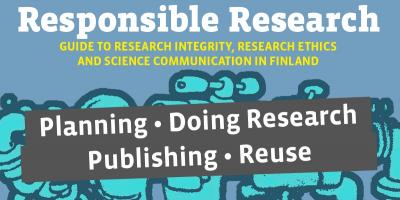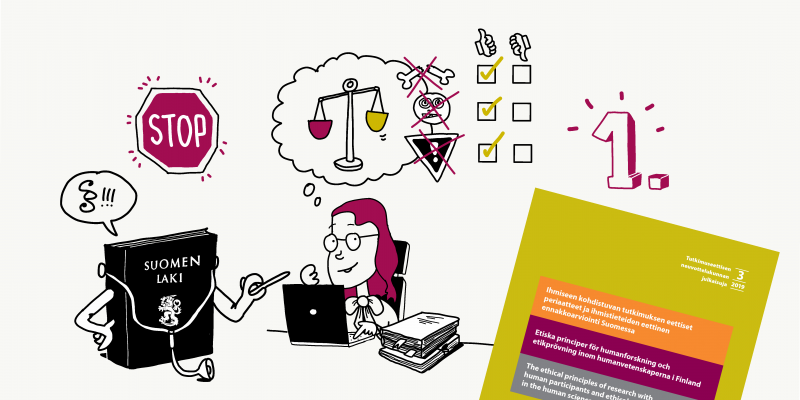
Tutkimuseettisen neuvottelukunnan tiedote 16.9.2019
The Finnish National Board on Research Integrity TENK has updated its national guidelines for ethical review in research involving human participants in Finland. The ethical principles of research with human participants and ethical review in the human sciences in Finland (2019) outlines the ethical principles of research and the process of ethical review in social sciences and humanities, paying special attention to the protection of personal data.
The guidelines are among the first of their kind that have been produced at national level in Europe.
“These principles have been drawn up to support researchers in their work,” says Sanna-Kaisa Spoof, Secretary-General of TENK. The work has been done together with the Finnish research community.
Almost all research organisations in Finland have committed to adhering to these guidelines. They are therefore obligated to provide ethical review services to their researchers, and their researchers must follow the ethical principles outlined in the guidelines.
The guidelines for ethical review apply to research designs where ethical review is not regulated separately in the Medical Research Act (488/1999).
Informed consent is a central ethical principle
TENK published the first edition of these guidelines in 2009, and the updated guidelines have been in force since October 2019. The new edition applies to a broader area of research than previously, covering now all research with human participants in the natural sciences and technology, in artistic research, and in social sciences and humanities. They can also be applied in non-invasive medical research.
The first part of the guidelines provides an overview of the ethical principles of research when human participants are involved. The key aspect is the interaction between researcher and research participant.
The principles outline the rights of the research participants, point out what to do when the research involves minors, people with limited capacity, or any intervention in the wellbeing of the participants, and explain how to process personal data and ensure the privacy of research participants. The fundamental starting point of scientific research is the participants’ trust in the process and the researchers. Informed consent is a central ethical principle in research with human participants.
The updated guidelines also support the application of the GDPR laws in the EU. Researchers must nevertheless follow the instructions of their own organisations, as the guidelines are not intended to serve as a GDPR guide.
Ethical review anticipates and prevents potential pitfalls
The purpose of ethical review is to anticipate potential harm that the research in question may cause, and to prevent this from happening. The guidelines list the situations where a researcher needs an ethical review statement. The review must be carried out at the planning stage, before any data is collected; it cannot be done after the fact.
An ethics committee assesses the potential risks of the research, the clarity of information provided, the data management plan, the consent given to the researcher by the participants and how that consent has been requested and documented, and the significance of the new information in relation to the potential harms and risks.
The importance of following the ethical guidelines must be stressed, given that failure to do so may constitute a violation of responsible conduct of research (RCR). This would be resolved through the formal investigation process, just as any other suspected RCR violation.
These ethical guidelines are part of the self-regulatory system of the research community in Finland. The guidelines, published in Finnish, Swedish and English, are openly and accessibly available here.

